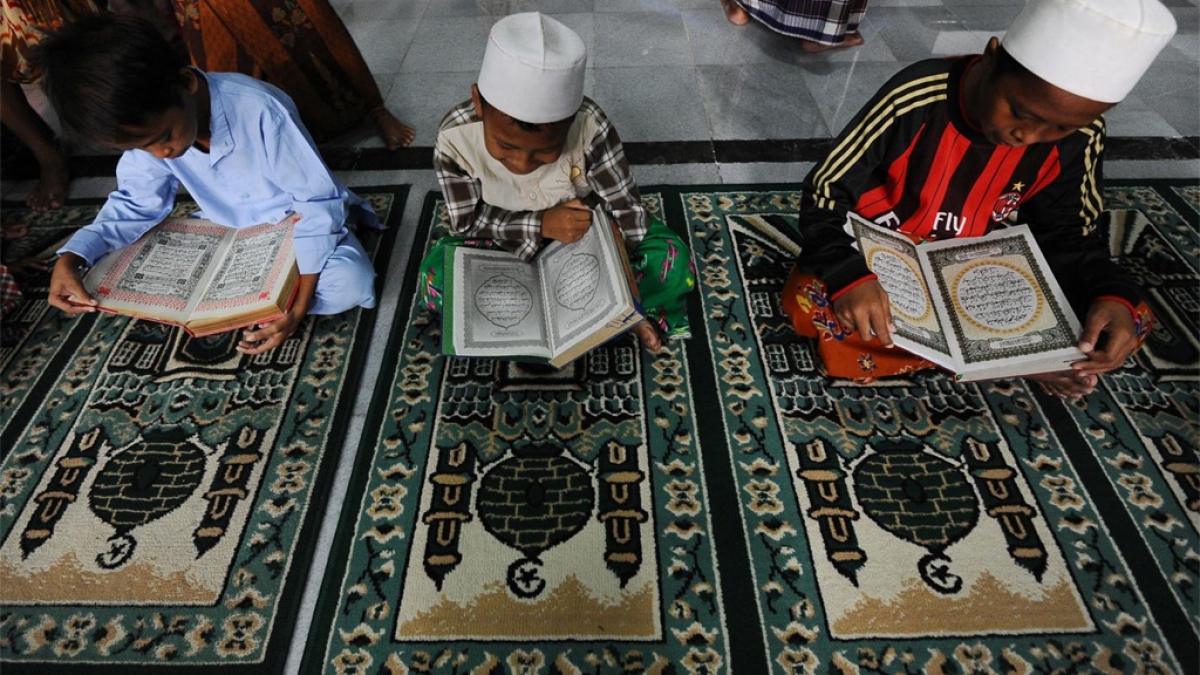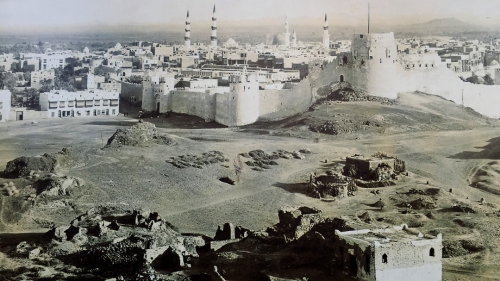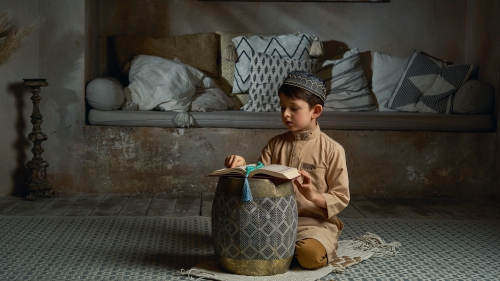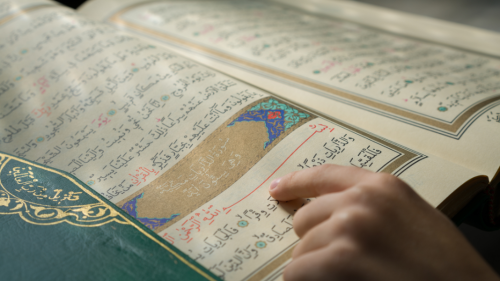The Prophet of the Little Ones Too

The Success Of guidebooks such as Supernanny and How To Speak So That Kids will Listen and Listen So That Kids Will Speak attest to the need parents have for advice, techniques, and direction in learning how to become effective parents. Different eras and divergent groups may debate the best way to raise children. But Muslims can look to the sunnah for the example the Prophet, sallallahu alayhe wa sallam, left us, both as a parent and a murabbi (moral mentor).
Children in the Household of the Messenger
Those who were children around the Messenger, sallallahu alayhe wa sallam, report playing with him, laughing with him, and receiving his spiritual guidance. It is little wonder, then, that they became when they matured, perhaps, the greatest collective force dedicated to the transmission of his teachings.
They entered his home, and found in it not only a sanctuary, but a spiritual school.
Many children were raised in his household: His own children and grandchildren; members of his extended family, like Ah ibn AbiTalib; those that served him, such as Anas and Zaid; others for whom he took responsibility for raising by marrying their widowed mothers, like the children of Umm Salamah; and the nephews of his wives, including Abdullah ibn Zubayr, who spent large amounts of time in the house of his aunt 'Aisha, and Abdullah ibn Abbas, who grew up under his shadows. All of them hastened to spend time in his company, spending their childhoods under the spiritual tutelage of the Prophet, thus becoming primary inheritors of his rich legacy. These children were the men and women who rose to prominence as moral and intellectual giants among succeeding generations.
Secrets of His Success
If we hope to understand how the Prophet, sallallahu alayhe wa sallam, unlocked the human greatness in these children, we must try to cull the principles underlying his interaction with them, and apply them systematically as child raising strategies. At least 9 crucial characteristics emerge as patterns of prophetic qualities of parenting. By parenting, here, we mean all instructive or meaningful contact between significant adults and the children who come into their spheres, even for brief time. Here are the 9 virtues the Prophet, sallallahu alayhe wa sallam, practiced with children:
1. HE FREELY EXPRESSED HIS LOVE FOR THEM
None in his household ever doubted his love for him or her, for he was quick to display his affection.
a. He expressed his love through nurturing and comfort. He consoled them himself, but was also moved by the crying of children in the presence of their parents. On hear- ing his grandsons cry, he told his daughter, Fatimah to soothe them, for he had compassion for their distress. The orphaned children of his cousin Ja'far found comfort in the loving hands of the Prophet, sallallahu alayhe wa sallam, who shared the pain of their loss, held them close, and took responsibility for their welfare.
b. He expressed his love through physical touch. His touch could be comforting, as it was when he held young infants or stroked the hair of the child on his lap. It could be playful, as it was when his grandchildren rode on his back. Even when Fatimah was an adult, he would rise to greet her and kiss her hands as an expression of his deep affection for her.
c. He gave them his focused attention and companionship. Whether they were young or older, he would be the first to greet, the most attentive of listeners, the last to remove his hand from the handshake, and the last to turn his back when the conversation had ended.
d. He expressed his love through verbal declarations. There were many, from Fatimah, to 'Aisha, to his granddaughter Umamah who he called the "most beloved" of people to him. But words of love were not only limited to his own family, as we see from the following hadith from Mu'adh: One day the Prophet, sallallahu alayhe wa sallam, said to him: "Mu'adh, I love you! I am advising you to supplicate at the close of every salah (obligatory prayer): "O Allah! Aid me in Your remembrance, and Your due thanks, and what is most beautiful in Your worship." (Abu Dawud)
e. He preceded a lesson in worship by first declaring his affections for his young followers: What a wonderful way of engaging a student!
f. He expressed his love through du'a-and the Prophet's supplications were accepted! While carrying his grandson Hasan on his shoulders, he prayed for him: "O Allah! I love him. So love him."
2. HE WAS PATIENT, SEEING THE CHILD RATHER THAN THE ACT OF DISOBEDIENCE
From spills on the carpet, to broken vases, to forgetting to finish a chore, how often does our anger outstrip our remembrance that the child's psychology and spiritual make-up come first? Does our response to the mistakes of these young ones square with what is likely just normal behavior for that age?
Anas ibn Malik began serving the Prophet, sallallahu alayhe wa sallam, when he was 8-years-old. Although happy to be in the company of the Messenger, sallallahu alayhe wa sallam, play often got in the way of accomplishing the tasks asked of him. He says:
The Messenger of Allah, sallallahu alayhe wa sallam, was the best of people in character. One day he sent me on an errand. I replied: "I will not go." But then, my conscience told me to do as he instructed. But when I came out, I passed by a group of children playing in the street, and I joined them. Later, the Messenger came out and caught me from the back, and I looked at him and saw that he was laughing. He said: "Anas. Did you do as I asked you?" I replied: "I am going, O Messenger of Allah." (Muslim)
No scolding, just a gentle reminder, and one that came with the Prophet's laughter at that, for the Prophet, sallallahu alayhe wa sallam, understood what lure a good game could have over a young boy. And that Anas, after all, was just a boy.
3. HE TAUGHT CHILDREN TO BE PROBLEM-SOLVERS
The Prophet, sallallahu alayhe wa sallam, included young people in his decision-making. Not only would he take suggestions from them, but he himself would call upon them for their opinions. When the Soorah of Al-Nasr was revealed, he asked the other Sahaba for their interpretations of the surah, before turning to his young cousin, Abdullah ibn Abbas for his explanation.
Indeed, the Prophet, sallallahu alayhe wa sallam, went beyond this. He allocated serious responsibilities to them based on their abilities. Osama bin Zayd was but seventeen years old when he was appointed by the Messenger, sallallahu alayhe wa sallam, as commander over the army to check the Romans, and his elevation over that of more senior Companions met with much surprise. As the son of Zayd, the freed slave and formerly adopted son of the Prophet, sallallahu alayhe wa sallam, and Barakah, the freed slave woman who had lived in the household of the Prophet, sallallahu alayhe wa sallam, since his birth and until after he became a Prophet at aged 40, Osama enjoyed a special relationship with the Messenger, sallallahu alayhe wa sallam. But this was not nepotism. It meant that he had received special attention and extensive training from the Prophet, which resulted in superior judgment and spiritual character.
4. HE USED EVERYDAY CONTEXT TO TEACH VALUES AND PRINCIPLES
Although some Companions, like the impoverished Ahl al-Suffah, or homeless Companions of the Bench in the masjid of the Prophet, sallallahu alayhe wa sallam, had special learning sessions with the Prophet, most of his lessons took place in everyday contexts.
Abdullah ibn Abbas, the Prophet's celebrated young cousin and the son of his beloved uncle, Abbas, narrates: One day, I rode behind the Messenger of Allah, sallallahu alayhe wa sallam, on his mount. He said to me: Young boy! Uphold (the limits set by) Allah, and He will uphold you. Uphold Allah and you will find Him ever before you. And should you ask of anyone, ask of Allah. And should you seek help, seek the help of Allah. And know, that if all the nations were to resolve to benefit you in any way, they could not benefit you, except as Allah has already decreed for you. And should they resolve to harm you in any way, they could not harm you except as Allah has already decreed for you. The pens have been lifted and the pages dried." (at-Tirmidhi)
What a profound lesson for anyone, But imagine the intensity of its far-reaching affect on a youngster in whom it would steep and with whom it would mature through the years.
5. HE REFINED THE MANNERS OF THE YOUNG, TEACHING BY EXAMPLE
The Prophet, sallallahu alayhe wa sallam, paid key attention to the good manners and proper etiquette of all, but he particularly emphasized their importance for the young, stating, that no father gives his children a finer gift than good manners. But the Prophet, sallallahu alayhe wa sallam, did not stop at verbal instruction: He modeled appropriate behavior. A child once eating with the Prophet, sallallahu alayhe wa sallam, was moving his hand to all corners of the communal plate, when the Prophet, sallallahu alayhe wa sallam, gently intervened. He taught the boy to eat reservedly from what was nearest to him, not only telling him so but taking the boys hand in his own and showing him prophetic manner of partaking.
6.HE RAISED CHILDREN TO BE WORSHIPPERS OF ALLAH BY HAVING THEM CLOSE TO HIM WHEN HE WORSHIPPED
For mothers of young children, who have difficulty finding a quiet, undisturbed time to perform their own salah, the example of the Prophet, sallallahu alayhe wa sallam, is extraordinarily heartening. He not only allowed them to be with him in the sacred moments of salah, but encouraged them to be there with him as they were, children. He made his salah with his granddaughter Umamah riding on his shoulders, and lengthened his sujood when his grandsons famously rode on his back. All of them became worshippers extraordinaire because they saw the most beloved of people to them immerse himself in worship, and with what joy allow them to participate at the youngest age in a manner appropriate to them. As children grew older, he let them accompany him in his late night vigils, adjusting their positioning, letting them see and hear him and participate with him in his most spiritual moments, and giving them a full glimpse of what a prophet, a man is like in his most emotional devotions to the Lord of All the Worlds.
7. HE JOINED CHILDREN IN PLAY
Our own childhood memories of play and laughter bring back warm feelings, and those who played with us enjoy a special place in our most tender hearts. How wondrous is it that the Prophet, sallallahu alayhe wa sallam, delighted in the games of children! With all the dignity, nobility, and holiness of the Prophet, sallallahu alayhe wa sallam, he felt none too lofty (though the most exalted of all men) to join heartily in their games, throw them over his shoulder, chase after them and, laughing, catch them. He took interest in their play, commenting to his young wife 'Aisha, before her age of consummation, about her toy, that he had never seen a horse with wings. She replied that this one was the horse of the Prophet Sulaiman, sallallahu alayhe wa sallam, at which the Messenger of Allah, sallallahu alayhe wa sallam, smiled heartily at her imaginative mind.
8. HIS METHOD OF DISCIPLINE WAS AMR BIL MA 'ROOWOFWA NAHI 'ANIL MUNKAR
This is the command of the Quran, and the order its injunction is vital: "Commanding good" precedes "forbidding evil." He is called in the Quran "basheer"-a giver of glad tidings-before the mention of "nadheer"-a forewarner. And his sunnah attests to the fact that he followed that implicit instruction, first calling to good, before forbidding evil.
With children, however, he was more apt to command good and demonstrate the behavior he wanted them to emulate, than he was to reprimand and forbid. All too often, we fall into the trap of saying: "Don't, " without taking the time to model the desired mode of conduct ourselves. There are dangers in saying "don't." Say it too often, and you risk reinforcing the very behavior you want to extinguish.
Love for the Prophet, sallallahu alayhe wa sallam, the desire to win his approval and earn his praise, was sufficient motivation for the child companions to strive to do good. And good they did. Our history bears witness to the bravery, generosity, courage, and moral principles demonstrated by those who were still children around the Messenger, sallallahu alayhe wa sallam.
9. HE TREATED CHILDREN WITH RESPECT
The Prophet, sallallahu alayhe wa sallam, beheld the little ones and the young with esteem. This is demonstrated by the focused attention he paid to them whenever they were in his company, in the politeness with which he spoke to them, in the serious way he took their behavior, the responsibilities he accorded them in accordance with their abilities, the gentleness with which he merely implied any admonition, the importance and sanctity he bestowed to their play, participating in it himself, and the recognition he showed for the fact that they carried within them young souls, which he sought at every appropriate opportunity to inform and nurture along side his own. One ought not lose sight of the fact that this attention, in all its details, elevated this child Companions to special status among their adult peers. For the words, lessons, and accompaniment of the Prophet, sallallahu alayhe wa sallam, were all like great medals of honor for life upon whomever he bestowed them. Thus he taught that childhood is a special and dignified phase of life and children are believers in their own right, not just adults-in-the- making.
A Legacy of Love
We judge a theory or philosophy by the result it produces. Abdullah ibn Abbas became known as "Al Habr wal bahr"-the sage of the ummah and the ocean of knowledge. His are the most esteemed explanations of the Quran until today, nor shall they be surpassed. When the perennial theme of the role of women in society comes endlessly up for debate, we forever have the ex- ample of 'Aishah, who set a standard of learned piety, female intellectual leadership, and community activism, not only for women, but for all believers. Anas ibn Malik grew up to be one of the foremost narrators of hadith. The list goes on.
But it is much more than knowledge that they have passed on. They lived the example of their Prophet-teacher. Their lives were that of ascetics, even when wealth was presented to them. They were the havens of the poor and destitute. They maintained their principled stance, even in the face of torture and oppression, never wavering from the moral path.
The Messenger, sallallahu alayhe wa sallam, left us with one great lesson: That spiritual, moral training cannot be done without a close bond of affection between parent and child, or student and teacher. Love is the basis of learning, and emulation out of intuitive understanding its highest form. And from his love, his legacy lives on and on.
SOURCES AND RECOMMENDED READING: Riyadus Saliheen, compiled by Imam Nawawi Child Companions Around the Prophet (peace be upon him) - Darus Salaam Research Division Companions of the Prophet-Abdul Wahid Hamid.
*****
Article provided by Al Jumuah Magazine, a monthly Muslim lifestyle publication, which addresses the religious concerns of Muslim families across the world.
To subscribe please visit https://www.aljumuah.com/subscription
Topics: Children, Prophet Muhammad (S)
Views: 10697
Related Suggestions


















